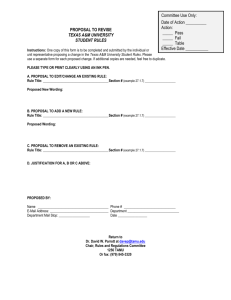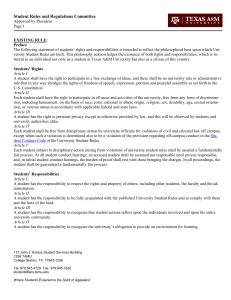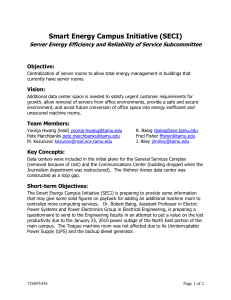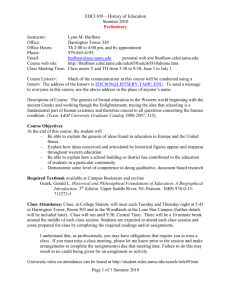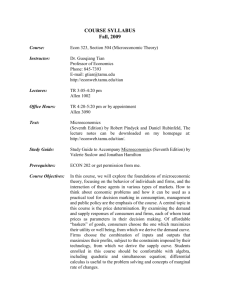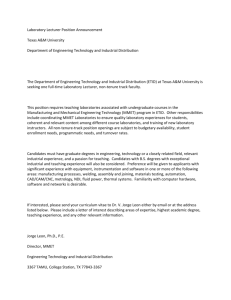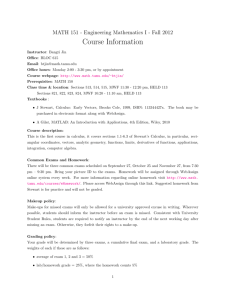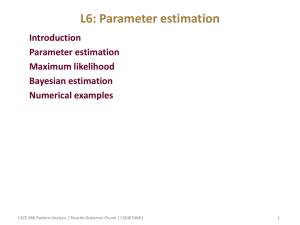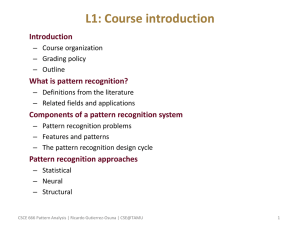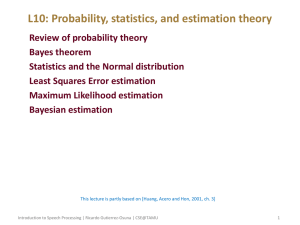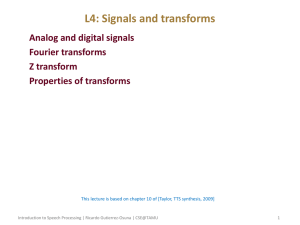What is speech processing?
advertisement
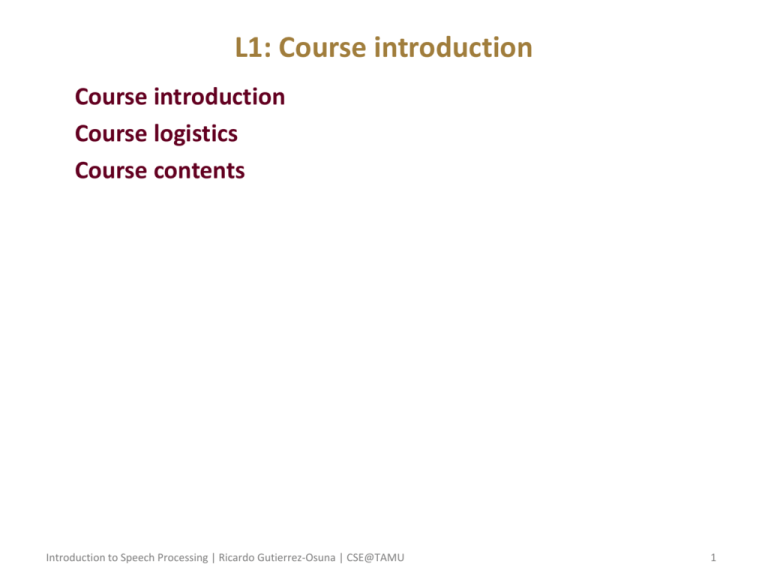
L1: Course introduction • Course introduction • Course logistics • Course contents Introduction to Speech Processing | Ricardo Gutierrez-Osuna | CSE@TAMU 1 Course introduction • What is speech processing? – The study of speech signals and their processing methods – Speech processing encompasses a number of related areas • • • • • Speech recognition: extracting the linguistic content of the speech signal Speaker recognition: recognizing the identity of speakers by their voice Speech coding: compression of speech signals for telecommunication Speech synthesis: computer-generated speech (e.g., from text) Speech enhancement: improving intelligibility or perceptual quality of speech signals The music carried on until ðə mju:zɪk kær[i,ɪ]d ɒn ʌntɪl after midnight and then the ɑ:ftə mɪdnaɪt[|, ]ən[d] ðen[|, ]ðə drummers became tired and drʌməz b[ɪ,ə]keɪm taɪəd[|, ]ən[d] the dancers became cold. ðə dɑ:nsəz b[ɪ,ə]keɪm kəʊld| Introduction to Speech Processing | Ricardo Gutierrez-Osuna | CSE@TAMU 2 • Applications of speech processing – – – – – Human computer interfaces (e.g., speech I/O, affective) Telecommunication (e.g., speech enhancement, translation) Assistive technologies (e.g., blindness/deafness, language learning) Audio mining (e.g., diarization, tagging) Security (e.g., biometrics, forensics) • Related disciplines – – – – – – Digital signal processing Natural language processing Machine learning Phonetics Human computer interaction Perceptual psychology Introduction to Speech Processing | Ricardo Gutierrez-Osuna | CSE@TAMU 3 • The course objectives are to familiarize students with – Fundamental concepts of speech production and speech perception – Mathematical foundations of signal processing and pattern recognition – Computational methods for speech analysis, recognition, synthesis, and modification • As outcomes, students will be able to – Manipulate, visualize, and analyze speech signals – Perform various decompositions, codifications, and modifications of speech signals – Build a complete speech recognition system using state of the art tools Introduction to Speech Processing | Ricardo Gutierrez-Osuna | CSE@TAMU 4 Course logistics • Class meetings – MWF 9:10-10:00am – HRBB 126 • Course prerequisites – ECEN 314 or equivalent, or permission of the instructor – Basic knowledge of signals and systems, linear algebra, and probability and statistics – Programming experience in a high-level language is required • Textbook – The course will not have an official textbook and instead will be based on lecture slides developed by the instructor from several sources – Additional course materials may be found in the course website http://courses.cs.tamu.edu/rgutier/csce689_s11/ Introduction to Speech Processing | Ricardo Gutierrez-Osuna | CSE@TAMU 5 • Recommended references – J. Holmes & W. Holmes, Speech Synthesis and Recognition, 2nd Ed, CRC Press, 2001 (available online at TAMU libraries) – P. Taylor, Text-to-speech synthesis, Cambridge University Press, 2009 – L. R. Rabiner and R. W. Schafer, Introduction to Digital Speech Processing, Foundations and Trends in Signal Processing 1(1–2), 2007 – B. Gold and N. Morgan, Speech and Audio Signal Processing: Processing and perception of speech and music, Wiley, 2000 – T. Dutoit and F. Marques, Applied signal processing, a Matlab-based proof-of-concept, Springer, 2009 – J. Benesty, M. M. Sondhi, and Y. Huang (Eds.), Springer Handbook of Speech Processing, 2008 (available online at TAMU libraries) – X. Huang, A. Acero and H.-W. Hon, Spoken Language Processing, Prentice Hall, 2001 Introduction to Speech Processing | Ricardo Gutierrez-Osuna | CSE@TAMU 6 • Grading – Homework assignments • Three assignments, roughly every 2-3 weeks • Emphasis on implementation of material presented in class • Must be done individually – Tests • Midterm and final exam • Closed-books, closed notes (cheat-sheet allowed) – Project • Team-based, in groups of up to 3 people • Three types: application of existing tools, development of new tools, design of new algorithms Homework Project Midterm Final Exam Weight (%) 40 30 15 15 Introduction to Speech Processing | Ricardo Gutierrez-Osuna | CSE@TAMU 7 Course contents • Introduction (3 lectures) – – – • Mathematical foundations (4 lectures) – – – – • Short-time Fourier analysis and synthesis Linear prediction of speech Source estimation Cepstral analysis Speech and speaker recognition (6 lectures) – – – – – – • Signals and transforms Digital filters Probability, statistics and estimation theory Pattern recognition principles Speech analysis and coding (4 lectures) – – – – • Course introduction Speech production and perception Organization of speech sounds Template matching Hidden Markov models Refinements for HMMs Large vocabulary continuous speech recognition The HTK speech recognition system Speaker recognition Speech synthesis and modification (4 lectures) – – – – Text-to-speech front-end Text-to-speech back-end Prosodic modification of speech Voice conversion Introduction to Speech Processing | Ricardo Gutierrez-Osuna | CSE@TAMU 8 Tentative schedule* Week 1 2 3 4 5 6 7 8 9 10 11 12 13 14 15 16 17 Date 1/17 1/19 1/24 1/26 1/31 2/2 2/7 2/9 2/14 2/16 2/21 2/23 2/28 3/2 3/7 3/9 3/14 3/16 3/21 3/23 3/28 3/30 4/4 4/6 4/11 4/13 4/18 4/20 4/25 4/27 5/2 5/4 5/9 Classroom meeting No class (MLK day) Course introduction Speech production and perception Organization of speech sounds Signals and transforms Digital filters Short-time Fourier analysis and synthesis Linear prediction of speech Source estimation Cepstral analysis Probability, statistics, and estimation theory Pattern recognition principles Template matching Hidden Markov models Review/catch-up day Midterm exam Spring Break Spring Break Refinements for HMMs Large vocabulary continuous speech recognition HTK speech recognition system Speaker recognition Speech synthesis (front-end) Speech synthesis (back end) Review/catch-up day Proposal presentations Prosodic modification of speech Voice conversion Review/catch-up day Final exam Prep day (no class) Reading day (no class) Project presentations (8:00AM - 10:00PM) Introduction to Speech Processing | Ricardo Gutierrez-Osuna | CSE@TAMU Materials due HW1 assigned HW1 due HW2 assigned HW2 due HW3 assigned HW3 due Project proposal Project report *This timeline assumes MW meeting times 9
